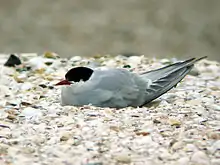ruva
Norwegian Nynorsk
Pronunciation
- IPA(key): /²rʉːʋɑ/
Alternative forms
Verb
ruva (present tense ruvar or ruver, past tense ruva or ruvde, past participle ruva or ruvt or ruvd, present participle ruvande, imperative ruv)
- to tower (to be very tall)
- Dei nye høghusa ruvar over dei små bygningane i gamlebyen.
- The new high-rise houses tower above the small buildings of the old city.
References
- “ruva” in The Nynorsk Dictionary.
Serbo-Croatian
Swedish

ruva (verb)
Etymology 1
Inherited from Old Swedish ruva, ruga. First attested in the 1500s.[1]
Cognate with Norwegian ruva, Icelandic hrufa, German rufe, Middle Low German rōve, and Middle High German hruf, ruf.
Also likely cognate with Swedish rysa (“shiver”) and rå (“uncovered”).
Noun
ruva c
Etymology 2
Unknown origin.
Possibly from Swedish ruka (“small pile”), cognate with Icelandic hrúga (“heap, pile”). First attested in 1640.[2]
Verb
ruva (present ruvar, preterite ruvade, supine ruvat, imperative ruva)
- to brood (to keep an egg warm)
- i Mordors land, där skuggorna ruvar
- in the land of Mordor, where the shadows brood
Conjugation
Conjugation of ruva (weak)
| Active | Passive | |||
|---|---|---|---|---|
| Infinitive | ruva | ruvas | ||
| Supine | ruvat | ruvats | ||
| Imperative | ruva | — | ||
| Imper. plural1 | ruven | — | ||
| Present | Past | Present | Past | |
| Indicative | ruvar | ruvade | ruvas | ruvades |
| Ind. plural1 | ruva | ruvade | ruvas | ruvades |
| Subjunctive2 | ruve | ruvade | ruves | ruvades |
| Participles | ||||
| Present participle | ruvande | |||
| Past participle | ruvad | |||
| 1 Archaic. 2 Dated. See the appendix on Swedish verbs. | ||||
Related terms
See also
References
Anagrams
This article is issued from Wiktionary. The text is licensed under Creative Commons - Attribution - Sharealike. Additional terms may apply for the media files.